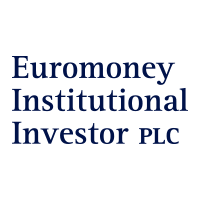Euromoney Institutional Investor PLC (LON:ERM), the global information business providing essential B2B information to global and specialist markets, announces results for the year ending 30 September 2018.
|
2018 |
|
2017 |
|
Change |
|
|
Adjusted1 |
|
|
|
|
|
|
• Total revenue |
£414.1 |
m |
£428.4 |
m |
(3%) |
|
• Adjusted operating profit |
£110.7 |
m |
£107.1 |
m |
3% |
|
• Adjusted operating profit margin |
27 |
% |
25 |
% |
2% |
|
• Adjusted profit before tax |
£109.2 |
m |
£106.5 |
m |
3% |
|
• Adjusted diluted earnings per share |
81.3 |
p |
76.4 |
p |
6% |
|
|
|
|
|
|
|
|
Underlying2 |
|
|
|
|
|
|
• Underlying revenue |
£388.4 |
m |
£378.4 |
m |
3% |
|
• Underlying profit before tax |
£100.6 |
m |
£92.8 |
m |
8% |
|
Statutory |
|
|
|
|
|
|
• Revenue |
£390.3 |
m |
£386.9 |
m |
1% |
|
• Operating profit |
£161.9 |
m |
£43.4 |
m |
|
|
• Operating profit margin |
41 |
% |
11 |
% |
30% |
|
• Profit before tax |
£161.2 |
m |
£40.7 |
m |
|
|
• Diluted earnings per share |
187.0 |
p |
37.9 |
p |
|
|
|
|
|
|
|
|
|
Net cash/(debt) |
£78.3 |
m |
(£154.6) |
m |
|
|
Final dividend per share |
22.3 |
p |
21.8 |
p |
2% |
|
|
|||||
|
A detailed reconciliation of the Group’s adjusted1 and underlying2 results is set out in the appendix to this statement. |
|||||
Strategic and operational highlights
· Encouraging overall performance
– A year of underlying growth
– Strong growth in Pricing, Data & Market Intelligence segment
– Good underlying revenue growth from events across all segments
– Action taken to mitigate headwinds in Asset Management segment
– Continued decline in advertising revenue, now accounting for only 9% of total revenue
· Active portfolio management in line with our strategy
– Three acquisitions and four disposals (additionally, Mining Indaba sold post year-end)
Financial highlights
· Underlying revenue up 3% (excluding Global Markets Intelligence Division which was sold in April 2018)
· Statutory revenue from continuing operations up 1%
· Underlying profit before tax up 8%, with Pricing, Data & Market Intelligence underlying profits up 18%
· Statutory profit before tax £161.2m, including one-off profits on disposals
· Adjusted operating profit margin improves from 25% to 27%
· Strong cash performance with 102% underlying cash conversion (2017: 118%)
· Net cash position of £78.3m supports continued investment in organic growth and acquisitions
· Final dividend per share up 2%
Andrew Rashbass, CEO, said:
“2018 was a successful year for Euromoney, delivering good growth in underlying revenue and profit as forecast at our March 2016 Investor Day. Our Pricing, Data & Market Intelligence segment recorded a very strong performance and there was good underlying growth in events across all segments.
Euromoney is making steady progress towards a 3.0 business model guided by our clear strategy: investing in semi-opaque markets where mission-critical information is hard to find; transforming our operating model; and actively managing our portfolio. This development, combined with our strong balance sheet underpins our confidence in further progress in the year ahead.”
1Adjusted measures include the results of continuing and discontinued operations and exclude the impact of amortisation of acquired intangible assets, exceptional items and other adjusting items in accordance with the Group’s policy set out on pages 5 and 6.
2 Underlying measures reported in 2017 included the adjusted results of continuing and discontinued operations and are stated at constant exchange rates, including pro forma prior year comparatives for acquisitions and excluding disposals and significant event timing differences. In 2018, the underlying measures are on the same basis but exclude discontinued operations. This means that the 2018 underlying measures only reflect the performance of the continuing businesses.
Strategy
Our strategy is to manage a portfolio of businesses in markets where information, data and convening market participants are valued. We deliver products and services that support our clients’ critical activities. We look to serve markets which are semi-opaque; that is, where the information which organisations need in order to operate effectively is hard to find.
Our strategy is designed to develop the businesses we own and deliver strategic, timely and well-executed acquisitions and disposals. We aim to allocate and recycle capital efficiently to good organic and inorganic opportunities via our ‘best-of-both-worlds’ operating model. Our ambition is to generate consistent and meaningful returns for our shareholders at relatively low risk.
Operating and Financial Review
On an underlying basis, it has been a year of growth for the Group despite the market headwinds affecting our Asset Management segment.
Revenue
Underlying revenue grew 3%, driven by a strong performance in our Pricing, Data & Market Intelligence segment as we continue to evolve towards a 3.0 business model. Total revenue for the year decreased by 3% to £414.1m largely because of the disposal of Global Markets Intelligence Division (GMID) in April 2018 and stronger sterling compared to the US dollar. Statutory revenue increased by 1% to £390.3m.
|
Revenue (£m)1 |
Subscriptions |
Advertising |
Events |
Other |
Total |
|||||
|
|
|
|
|
|
|
|
|
|
|
|
|
Asset Management |
119.7 |
(5%) |
11.9 |
(7%) |
19.4 |
6% |
– |
(62%) |
151.0 |
(4%) |
|
Pricing, Data & Market Intelligence |
90.6 |
12% |
16.9 |
– |
36.7 |
6% |
0.5 |
(43%) |
144.7 |
9% |
|
Banking & Finance |
8.6 |
2% |
8.7 |
(9%) |
52.3 |
8% |
1.1 |
8% |
70.7 |
5% |
|
Commodity Events |
– |
|
– |
|
20.6 |
9% |
0.2 |
(40%) |
20.8 |
9% |
|
|
218.9 |
2% |
37.5 |
(5%) |
129.0 |
7% |
1.8 |
– |
387.2 |
– |
|
Foreign exchange gains on forward contracts |
|
|
|
|
|
|
|
|
1.2 |
– |
|
Underlying revenue |
|
|
|
|
|
|
|
|
388.4 |
3% |
|
Sold/closed businesses2 |
|
|
|
|
|
|
|
|
25.7 |
– |
|
Total revenue |
|
|
|
|
|
|
|
|
414.1 |
(3%) |
1 Percentages are underlying growth rates compared to last year. Underlying measures are detailed on page 7.
2 Sold/closed businesses include continued and discontinued operations
The Group’s Pricing, Data and Market Intelligence businesses – focused on price discovery, data and market intelligence – performed strongly, with underlying operating profit growing 18%. Subscription revenues increased by an underlying 12%, mainly due to an excellent performance from Fastmarkets, our price reporting agency. In August 2018, we acquired Random Lengths, a wood-pricing provider and leading news source for the North American lumber industry for $18.8m, filling a gap in the Group’s forest products price-reporting coverage.
Structural and cyclical industry issues facing investment research continued to have an impact on our Asset Management segment. This led to a decline in revenues and profits in the segment. The performance of Institutional Investor, where revenues are sourced from asset management marketing rather than research budgets, improved during the year. We have conducted a strategic review of our Asset Management segment to help our investment research businesses (BCA and NDR) adapt to this challenging business environment. This review has delivered significant cost savings of around £7m across the investment research businesses, which have been partly re-invested in sales and marketing, digital technology and product development. The outlook for our investment research businesses continues to be challenging, but management actions already taken should mitigate some of the revenue downsides in 2019. For example, we transitioned Institutional Investor magazine to digital-only during 2018. Institutional Investor is now largely a membership, events and research business, with publishing making up just 9% of its revenue.
The Commodity Events and Banking & Finance segments, which together accounted for 22% of total revenue, returned to growth following the strategic measures taken during 2017, which focused events revenues on large core events and eliminated low-margin events and training courses. In October 2018, we sold Mining Indaba as it did not align with our strategy. Following this disposal, the Commodity Events segment will be removed for reporting purposes, with the remaining Commodity Events being moved into the Pricing, Data & Market Intelligence segment, reflecting how they will be managed in future.
Underlying subscription revenues, which make up 56% of Group underlying revenues, increased by 2%, with strong growth in Pricing, Data & Market Intelligence more than offsetting the reduction in the Asset Management segment. Although underlying advertising revenues declined by 5%, the rate slowed from 2017 (a reduction of 8%), reflecting success in the investment in thought-leadership products and in directories. Advertising revenue now represents only 9% of total revenue. Underlying event revenues increased 7%, with the Banking & Finance and Commodity Events segments the most significant growth areas, but with all segments performing well. The strategic focus to build large, repeat, high-margin events is delivering strong results. Mining Indaba performed well during the year, with underlying revenue growth of 18%.
Active portfolio management
One of the Group’s three pillars of strategic activity is active portfolio management, minimising investment in businesses where the market is weak and the business model structurally challenged and investing where businesses are structurally strong and supported by market tailwinds. During the year, the Group made three acquisitions and four disposals (additionally selling Mining Indaba just after the year end).
The acquisitions included investment in price discovery and asset management, in each case where the businesses are deeply embedded in the workflows of their customers and their product suite is complementary to existing businesses. The main disposal was of GMID, which although a good business was not strategic, and was sold to recycle capital towards our main investment themes. This portfolio management forms part of our evolution towards a 3.0 business model.
Profit
The adjusted operating profit margin increased by two percentage points to 27% largely due to our choices on allocation of capital, our focus on driving out costs and improving sales mix. 2018 saw significant investment in the Pricing, Data & Market Intelligence segment and the integration of RISI. The drag from our accelerated investment in central functions following the DMGT sell down in 2017 slowed in the second half of 2018, with that team now largely complete. Adjusted operating profit increased by 3% to £110.7m.
Adjusted profit before tax increased by 3% to £109.2m. Adjusted diluted earnings per share increased by 6% to 81.3p (2017: 76.4p), largely reflecting the combined benefit of the improvement in earnings and the reduced number of shares in issue following the share buyback. Underlying profit before tax grew by 8% reflecting operational gearing and cost control.
The statutory profit before tax of £161.2m is higher than the adjusted profit before tax mainly due to exceptional items of £81.4m offset by acquired intangible amortisation of £22.7m and a £6.6m contribution from discontinued operations. Statutory operating profit increased from £43.4m to £161.9m resulting in an improvement in the operating margin from 11% to 41%.
Exceptional items
The exceptional credit for continuing operations of £81.4m principally comprises £86.8m of profit on disposal of businesses. Full details are included in note 3. The discontinued operations exceptional item of £90.3m relates to the profit on disposal of GMID.
Tax
The adjusted effective tax rate is 20% (2017:19%) which is based on adjusted profit before tax and excludes deferred tax movements on intangible assets, tax on exceptional items, prior year items and other tax adjusting items as described further below. The tax rate in each year depends mainly on the geographic mix of profits and applicable tax rates. US tax reform did not have a material impact on the adjusted effective tax rate for 2018.
The Group’s statutory effective tax rate increased to 32% compared to 8% in 2017. The increase in rate is driven by the tax on disposal of shares in GMID and non-recoverable foreign withholding tax on the payment of a $380m intercompany dividend from Canada to the UK in the year.
Significant reconciling items between the adjusted and statutory effective tax expense include: a tax charge of £16.8m that arises from the disposal of GMID and Dealogic, non-recoverable withholding tax of £14.6m that arises from a $380m intercompany dividend and the impact of US tax reform including a deferred tax credit of £4.7m arising from the revaluation of the Group’s US net deferred tax liabilities and a one-time deemed repatriation tax charge of £3.2m related to unremitted earnings. Prior year items primarily reflect an increase in a provision for an uncertain tax position in relation to an HMRC enquiry. These items are excluded from adjusted tax as they are significant and not in the ordinary course of business. Full details are included in note 5.
Following a review of the impact of US tax reform on the Group’s debt profile, certain financing arrangements have partially been unwound during the year (and will be fully unwound by the end of the next financial year) and a dividend was paid from our Canadian subsidiary. The result is that the adjusted effective tax rate is now expected to remain at 20% in 2019 rather than 23% as previously guided.
The Group continues to have a number of uncertain tax positions, primarily the Canadian and UK exposures which have been highlighted in previous periods, for which the maximum exposures are explained in note 5.
Dividend
The Group has a progressive dividend policy targeting a dividend pay-out ratio of 40% of adjusted diluted earnings per share. The Directors are recommending a final dividend of 22.3 pence per share, which subject to Shareholder approval at our AGM on 1 February 2019 and will be paid on 14 February 2019 to shareholders on the register at the close of business on 30 November 2018. Together with the interim dividend, this makes a total dividend for the year ended 30 September 2018 of 32.5 pence per share, a 6% increase on the 30.6 pence dividend for the year ended 30 September 2017.
Net cash/(debt) and cash flow
Net cash at 30 September 2018 was £78.3m compared with net debt of £37.0m at 31 March 2018 and net debt of £154.6m at 30 September 2017. The move to a net cash position follows receipt of net proceeds of £226.5m from disposals including Dealogic and GMID, as well as strong underlying operating cash flows of £113.3m. The increase in cash was partly offset by dividend payments of £34.8m and payments for acquisitions and increased subsidiary holdings of £30.8m.
Following large disposals and continued strong operating cash flows, in May 2018 the Group repaid its $100m and £40m term-loans and increased the size of its revolving credit facility to £240m. Cash used in financing activities was £213.7m (2017: cash generated £21.7m), principally from the repayment of borrowings of £167.7m and the purchase of additional interest in subsidiary undertakings of £10.1m.
The Group’s underlying operating cash conversion for the 12 months to September was 102% (2017: 118%). The 2017 cash conversion included one-off improvements in working capital performance.
Currency
The Group generates approximately two-thirds of its revenues in US dollars, including approximately 40% of the revenues in its UK-based businesses, and approximately two-thirds of its operating profits are US dollar-denominated. The exposure to US dollar revenues in its UK businesses is partially hedged using forward contracts to sell US dollars, which delays the impact of movements in exchange rates for at least a year. However, the Group does not hedge the foreign exchange risk on the translation of overseas profits.
The average sterling-US dollar rate for the year to 30 September was $1.35 (2017: $1.27). This had a negative impact on headline revenue growth rates for the year by approximately two percentage points though benefited adjusted profit before tax by £1.5m. Each one cent movement in the US dollar rate has an impact on translated profits, net of UK revenue hedging, of approximately £0.7m on an annualised basis. The Group also translates its non-sterling denominated balance sheet items resulting in a loss in 2018 of £1.5m (2017: £0.4m).
Outlook
The UK’s exit from the EU may lead to foreign exchange volatility and general business uncertainty in the forthcoming year. The outlook for our Pricing, Data & Market Intelligence segment is broadly consistent with 2018, however, continuing the strong growth we had in events revenues through into 2019 will be a challenge. Euromoney is making steady progress towards a 3.0 business model guided by our clear strategy. Combined with our strong balance sheet, this underpins our confidence in further progress in the year ahead.
Further trading updates
Further coverage of these full-year results will be provided to analysts at a presentation starting at 9:30am on 22 November at the offices of UBS. Euromoney intends to provide a brief trading update on 1 February 2019.






































